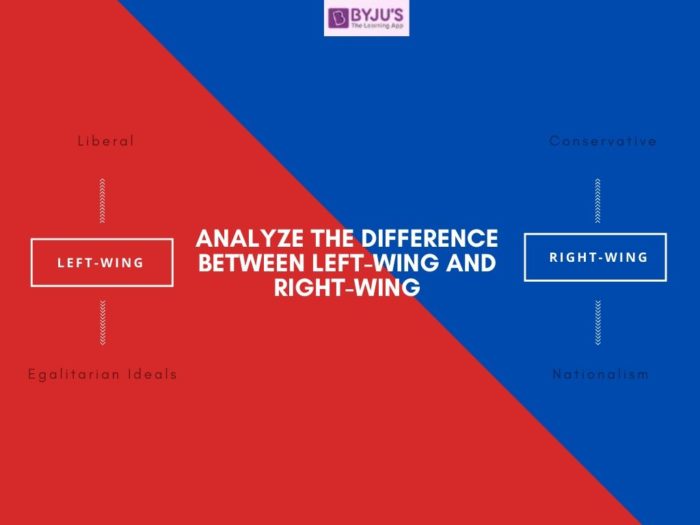Right-Wing Politics and Left-Wing Politics are two warring ideologies different in their outlook and applications.
Right-Wing politics is centered around beliefs that certain social orders and hierarchies are inevitable and natural, with this belief being supported by natural law or tradition.
Left-wing politics supports social equality often in opposition to social hierarchy or any other form of class division.

The above are just some of the differences between Right-Wing and Left-Wing Politics that this article will highlight within the context of the IAS Exam
Differences between Right Wing and Left Wing
| Left-Wing |
Right-Wing |
| Left-wing politics is more liberal in its approach and outlook | Right-wing politics are more conservative. |
| Left-wing economics policies involve reducing income equality, increasing tax rates for the wealthy, and government spending on social programs and infrastructure | Its economic policies involve low taxes, less regulation on businesses by the government |
| Those belonging to the left-spectrum of politics believe that society will benefit from an expanded role for the government | Right-wing ideologies believe that the best outcome for society is delivered when individual rights and civil liberties are paramount with limited involvement of the government |
| Left-wing politics is characterized by an emphasis on equality, fraternity, progress, and reform | Right-wing politics is characterized by ideas of authority, hierarchy, tradition, and nationalism |
| Left-wing nationalism is based on social equality, popular sovereignty, and national-determination. It associates itself closely with national liberation movements | Right-wing nationalism is influenced by Romantic Nationalism where the state derives its legitimacy from the culture it governs, including, language, race, and custom “born” within this culture |
| Left-wing politics is traditionally against religious institutions and believe that state and religion must be separate from each other (Secularism) | Right-wing politics have always found supporters who believe that religion should play an expanded role in society. |
| Populist ideas in the left-wing do not include horizontal exclusion and will rely more on egalitarian ideals. | Populism is a recurring theme in right-wing political circles. Populism is a political approach that appeals to ordinary people who feel that their rights are ignored. |
| The term ‘Left-wing’ has a similar origin during the French revolution where anti-monarchy revolutionaries were seated on the left side of the hall. | The term ‘Right-wing’ has its origins during the days of the French Revolution (1789-1799) where the supporters of the Monarchy were seated on the right hall of the National Assembly |
Left-wing and right-wing politics is a featured topic in the Polity segment of the UPSC Exam. Aspirants can find more study materials for this segment and related articles through the links given below:
- UPSC Indian Polity Notes
- Syllabus and Strategy for UPSC Polity
- Difference between Polity and Political Science
- Left-wing Extremism in India
- Difference Between Communism, Capitalism, and Socialism
- Differences between the Indian Government and the U.S Government
Difference Between Left-Wing and Right-Wing – Download PDF Here
Frequently Asked Questions on Difference Between Left Wing and Right Wing
Q 1. What is the key difference between Left-wing and Right-wing?
Q 2. Which among left and right-wing is more liberal?
For more UPSC Exam related preparation materials visit the following links given below:
Related Links
| NCERT Books | UPSC Exam Pattern | Current Affairs Quiz |
| Current Affairs PDF | World Current Affairs | UPSC Syllabus in Hindi PDF |
| Green Revolution in India | Pradhan Mantri Matritva Vandana Yojana | Project Tiger |

Comments